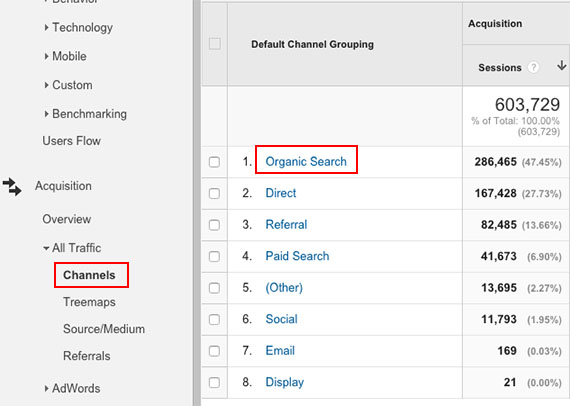When you look at your results every week it can be sometimes difficult to see the whole picture. It’s even more confusing with SEO results. Looking at your sales and number of visitors week by week doesn’t always bring you to understand how it is going and what are the reasons it’s going that way. In this article, we are going to see how to analyze the basic results of Google Analytics: sales and visitors, ask yourself the right questions to understand and draw conclusions out of those data.

Each week you probably look at your results and you maybe say “this week is a good week because it’s better than last week” or the opposite. But it’s not because it has been better or worse than the previous week that it’s going good or bad.

How to see if your week results are good or bad?
-
Is it a good/bad week compare to the rest of the month?
Compare the revenue to 30 days ago to see if the actual trend because it could be that the week is better than last week just because last week was way worse than the average. Check if there are any peaks during the last 30 days that could affect the average or if the visits or revenue are stable for the whole time and just increase/decrease this week.
-
Is it a good/bad a good week compare to the month before?
That way, you can see if the revenue and/or visits are higher this week of the month compared to the same week last month.
-
Was it also a good/bad week last year during the same period?
Compare the growth/loss of this week to the same period last year. It could be that it’s a normal growth for the period. For example around Christmas maybe your sales are always up 20% and you can establish that it’s due to the season and not really due to your SEO efforts paying back. You can also see if you actually grow since last year but you should also look at your result every month and compare them to the rest of the year to be able to draw that conclusion before waiting a whole year!
-
Is this week better/worse than the year average?
Compare this week to the average results of the year divided by week to be able to see if the week is better than the average results.
-
Is it a good/bad week on all channels?
Check all channels to see if the increase/decrease in revenue or visitors is happening everywhere or only in SEO. If it is the same in all channels it could mean a change in the behavior at this moment from your market in general.
What to conclude if you have an increase/decrease in visitors?
-
Do we have more/fewer visitors because more/fewer people are looking for you or because more/fewer people are finding you?
Look at the number of impressions and clicks to see if you have been shown to more/fewer people and compare it to the number of clicks. If you have more impressions or clicks you can conclude in an improvement in your position in the SERP on some keywords which brings more visitors. More impressions and fewer clicks could also mean an improvement in not relevant keywords, meaning that you are rank better for words that are actually not your consumers.
Check then the average position to see if it’s worse or better than last week But be careful it’s an average which doesn’t take into account the volume of a keyword. Meaning that you can improve on average but have actually a keyword with high traffic actually going down at the same time as another keyword with low traffic going up.
That is why those 3 data: Impressions, clicks and average position should be analyzed together and not separately.
-
Are the visibility and estimated traffic also up/down?
Check the weighted average position of your rankings. You can calculate it by checking the volume of each keyword in keyword planner + the position of the keyword but you can use another tool like Semrush who does it for you. With Semrush you can compare the visibility and the estimated traffic to actually see if your conclusion from the step before is true. Meaning that if you estimated traffic is up and your visibility stable or down, you might have gone up with high traffic keywords.
-
Which keywords bring the people and is there any change this week?
Use the first 25 result of the Landing pages and Queries to see if any big change there. If a landing page is getting much more click than before it could be because the position of the keyword for this page improved or that the traffic is getting bigger for that keyword.
What to conclude if you have an increase/decrease in sales?
-
Do we have more/fewer sales because we have more/fewer visitors?
Check the correlation between visits and sales. If you have more visits it’s normal to have more sales but to have more visits but not more sales could show a problem or a disinterest from your consumers.
-
Do we have more/fewer sales (revenue) because the average order value is lower?
Check the average order value or the correlation between the number of sales and the revenue. an increase in transactions should also bring an increase in revenue.
-
Do we have more/fewer sales because the people who visited were more/less interested in buying?
We can suppose a disinterest in buying at the moment if the revenue is lower but the visits are increasing or stable. Maybe people are interested in the product but are waiting for a better period to buy.
-
Which pages or keywords (don’t) convert?
Again, use the first 25 result of the Landing pages and Queries to see if any big change there. If a landing page is getting much more click than before it could be because the position of the keyword for this page improved or that the traffic is getting bigger for that keyword.
If we see the average position going down, it could be that we have lost some keywords with low volume which were converting more. We can’t see those keywords ranks in queries of analytics because some of the very specific queries are grouped under (Others).
Conclusion
Those 12 questions are the perfect way to explain your week analytics SEO results. They fit almost every situation and will help you draw the right conclusions.You’ll never end up saying again “It’s was a good week” just by comparing this week to the previous week. You’ll never miss seeing the impact of a change in your keywords positions. You’ll be more aware of the season trend of your market and won’t lose time trying to fix an issue when there isn’t one.


I am really loving the theme/design of your website. Do you ever run into any web browser compatibility problems?
I was excited to discover this website. I want to to thank you for your time for this wonderful read!! I definitely liked every part of it and i also have you book-marked to look at new things on your website.
Very good article. I certainly appreciate this website. Keep writing!